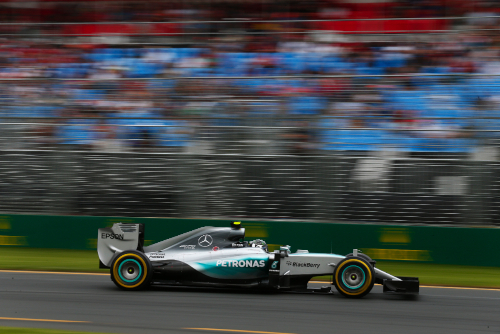Features - Straight Talk
MARCH 18, 2015
A worrying passion for self-harm
BY LUIS VASCONCELOS

The first Grand Prix tends to be an exciting event, with new cars, and drivers with new rules, so the combination creates a lot of expectations for the fans. So, when the biggest story of the first race is a court case between a driver whose contract was not respected and a team that is struggling to survive, Formula One should really stop and do a reality check, because there's no bad situation that cannot get worse...
The first Grand Prix of any season tends to be an exciting event. There are new cars, drivers in new teams and new rules, so the combination of all these novelties creates a lot of expectations for the fans and even for the people working in the sport. So, when the biggest story of the first race of a season is a court case between a driver whose contract was not respected and a team that is struggling to survive, Formula One should really stop and do a reality check, because there's no bad situation that cannot get worse...
From the sporting point of view, the Australian Grand Prix was a non-event. Mercedes trashed the opposition with a car that is, essentially, one second per lap faster than its nearest rival and we were even denied an internal battle - like the ones everyone enjoyed in Bahrain, Canada or even in Monza, last year - as Lewis Hamilton was head and shoulders above his team mate Nico Rosberg both in qualifying and the race.
With only 15 cars actually making it to the grid and the two Lotus retiring on the first lap, what the paying spectators had to watch was a race with just 13 cars, two of them dropping out and the remaining eleven finishing with respectable gaps between them, after one hundred minutes of very little wheel-to-wheel action. Frankly, hadn't it been for Jenson Button's robust defence of penultimate place against a strangely erratic Sergio Perez, there would have been nothing to get excited about during the 58 laps of the race.
Once again it was clear the current set of technical rules, combined with the limitation of testing, makes it tremendously hard for the manufacturers to guarantee the reliability of their Power Units. It is also difficult to explain to the average fan why some of the systems don't work. The sport has overcomplicated maters and would do well to dumb down the rules in order to be attractive to more people.
Having said that, Red Bull's reaction to Mercedes' domination reminded me of the kids that couldn't really play football but owned the only ball on the street, as they would threaten to take the ball home if their team didn't win the game. Yes, it's terribly frustrating to work hard and come away with a poor result, but if only the teams that are winning would stay in Formula One, then we'd have just two or four cars racing all the time and no one would watch that.
Besides, Red Bull was not just trashed by Mercedes in Australia: they clearly lost out to Ferrari and Williams and, in the race, Daniel Ricciardo finished even behind Felipe Nasr's Sauber, so before Red Bull tries to convince the FIA to change the rules, in order to cut Mercedes' advantage, they should work to become the second most competitive team in the field - not the fifth one, as they are at the moment.
There is, though, some truth in Christian Horner's comments that when his team was beating the opposition, the FIA changed the interpretation of the rules on a number of occasions to cut their advantage, but that didn't stop Sebastian Vettel from winning four consecutive titles, two of them by a country mile. So, even with all the goodwill in the world, the rule makers cannot make a better team lose if they keep doing a top job - and, anyway, why should it?
Bickering in public doesn't do the sport any favours and these things should be discussed and resolved behind closed doors. Yes, the FIA should intervene, but it has sold the right to make the rules to the five richest teams and has been so quiet for years that it's easy to forget it owns the championship. And given the five richest teams cannot even agree when and where they should meet the next time, let alone any meaningful changes to the rules, Formula One is in a vicious circle that, from the outside, looks like it's ruled by a strange tendency for self-harm.
Those who dislike Formula One don't even need to write or speak against it: the teams, the drivers, Ecclestone and the organisers do a great job of hurting Formula One by themselves. It's like no one realises how fragile the health of the championship is, as they only care for their personal wealth. But this policy will surely end in disaster for everybody, so it's high time Jean Todt flexes his muscles and makes the changes that are needed without consulting the teams, Ecclestone or the organisers. It's the fans and the sponsors he has to listen to, for without them Formula One's wealth will disappear in just a few years.